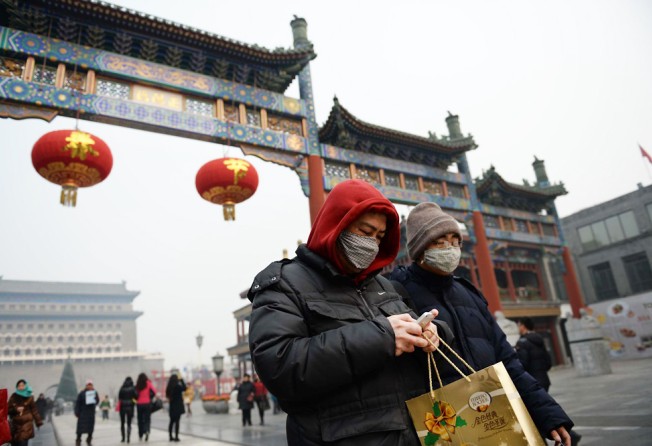
Pollution eases in Beijing as holiday fireworks come to end
Fine particulate readings fall as Lunar New Year festivities subside, but remain at harmful levels

Air pollution in Beijing eased yesterday after two days of hazardous levels partly caused by firework displays traditionally used to mark the end of the Lunar New Year holiday.

The World Health Organisation advises day-long exposure of no higher than 25.
Thirty-three cities on the mainland recorded air quality indexes at heavily polluted levels on February 14, the end of the 15-day Lunar New Year celebration.
The PM2.5 level in Beijing's eastern Tongzhou district reached 900 even as residents set off fewer fireworks this year, according to Xinhua.
"The recent pollution may be caused by fireworks," said Li Zhenlong, 30, who works in the energy industry in the capital. "We shouldn't completely forbid firecrackers, this depends on people's own free will, while the government should largely promote not doing it."
Fireworks sales in Beijing during the festival declined 38 per cent from a year earlier, Xinhua reported, citing data from the municipal fireworks office.
China Central Television has accused Beijing officials of turning a blind eye to the city's worsening air quality in recent days after they did not initiate an emergency response to the situation.
"The government can't act like it is blind. It has to shoulder its responsibility," the business channel of the state network wrote on its Sina microblog. "Isn't there anybody in charge of handling the smog?"
Beijing announced in October that it would take emergency measures, including cutting road traffic and shutting schools when the city issues a red alert, its highest air pollution warning.
A blue alert, the lowest of the four levels, had been in effect since Saturday, according to Xinhua.
The authorities are seeking to clean up the nation's air and water in an effort to assuage public anger over environmental degradation.
Pollution was the leading cause of social unrest on the mainland, according to Chen Jiping, a former member of the Communist Party's Central Politics and Law and Commission.
"Smog is due to emissions from factories and cars," said Zhang Jiaxing, a 16-year-old building guard.
"Of course fireworks are also bad for the air even if not a main reason. The government should strengthen the environment protection industry and investigate and punish polluting factories," Zhang said.
The mainland suffered the worst air pollution in 52 years last year, according to the Ministry of Environmental Protection.